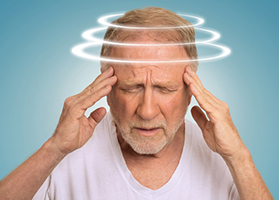 It’s amazing that even if vertigo and dizziness is the number one complaint doctors receive, the traditional medical system has no cure.
It’s amazing that even if vertigo and dizziness is the number one complaint doctors receive, the traditional medical system has no cure.
Drugs, surgery and other methods have been proven useless in most cases.
But if you tackle the underlying cause of vertigo and dizziness, you can reverse this number one cause of broken bones in elderly – often within minutes.
1. According to a 2014 study in the journal Acta Medica Mediterranea in which the authors compared the vitamin B12 levels of people with and without vertigo, vitamin B12 deficiency exists in most people who suffer from extreme dizziness.
Supplementing with B12 is easy. Go for high quality supplements found in your local health food store.
2. According to a study conducted by Italian researchers in 2008 and printed in Clinical & Experimental Immunology, many people who report to emergency departments with extreme vertigo have autoimmune thyroid disorders in which their immune systems mistakenly attack and damage their own thyroid glands.
Have your doctor check your thyroid function, which is a simple test.
3. According to a 2015 article on Medscape, vertigo is a serious problem for people who often get migraines. While some people experience vertigo before or during the headache, most people experience it during headache-free periods.
We’ve found that migraine has a somewhat very similar cause as vertigo. You can learn to tackle your migraine and headaches naturally here…
4. The problem is severe enough to impose a big financial burden on sufferers, economies, and health systems. In a study published in Front Neurol in 2014 in which researchers compiled the details of 4,105 vertigo sufferers in 13 countries, it turned out that half of them were unemployed, 69.8 percent of the employed ones had cut the workloads, and 63.3 percent had lost workdays. They also spent considerable economic resources on emergency services, primary consultations, specialist consultations, and hospital stays.
5. According to a survey of the same 13-country database published in Neurol in 2013, vertigo most commonly occurs in women over the age of 40 years. It is also more common among older than younger men.
6. In 2013, Brazilian researchers demonstrated in a paper published in International Archives of Otorhinolaryngology that people with high blood pressure were more likely to suffer from vertigo than those with normal blood pressure. The subjects were 493 seniors over the age of 60.
You can discover the best way to drop your blood pressure naturally here…
7. People with disturbed insulin metabolism and full-blown diabetes are more likely to have ear problems than the rest of the population, including vertigo and tinnitus. The International Tinnitus Journal included a study by Polish scientists involved 48 patients with ear problems and 31 healthy subjects. 4 people with ear disturbances also had diabetes while none in the healthy population did. 27.1 percent of those with vertigo and tinnitus had problems metabolizing insulin, while only 9.7 percent of the healthy population did.
Here is the 3-step strategy that reverses type 2 diabetes in 8 days or less…
8. In a 2010 edition of Public Medical Forum Magazine, Chinese researchers demonstrated that people with high cholesterol and other lipids (fats) in their blood had a much greater chance of developing vertigo than those with normal levels.
Here is a simple step-by-step strategy to get your cholesterol under control…
9. Some common and well understood causes of vertigo are loose calcium and protein-based sensing crystals in your inner ear canals (benign paroxysmal positional vertigo), a buildup of fluid and pressure in your ear (Meniere’s disease), inflammation of the nerves that help your body sense balance (Vestibular neuritis), and brain damage from injury or stroke.
Vertigo is actually very easy to heal if you use the right method.

 Overcoming IBD
Overcoming IBD Multiple Sclerosis
Multiple Sclerosis Banishing Bronchitis
Banishing Bronchitis Gum Disease Gone
Gum Disease Gone Overcoming Onychomycosis
Overcoming Onychomycosis Neuropathy No More
Neuropathy No More The Prostate Protocol
The Prostate Protocol Brain Booster
Brain Booster
 Ironbound
Ironbound
 Solution for Shingles
Solution for Shingles
 The Bone Density Solution
The Bone Density Solution
 The Ultimate Healing Protocol
The Ultimate Healing Protocol
 The Parkinson's Protocol
The Parkinson's Protocol
 The Chronic Kidney Disease Solution
The Chronic Kidney Disease Solution
 Overthrowing Anxiety
Overthrowing Anxiety The Fatty Liver Solution
The Fatty Liver Solution The Hypothyroidism Solution
The Hypothyroidism Solution
 The End of Gout
The End of Gout The Blood Pressure Program
The Blood Pressure Program
 The Oxigized Cholesterol Strategy
The Oxigized Cholesterol Strategy
 Stop Snoring And Sleep Apnea Program
Stop Snoring And Sleep Apnea Program
 The Arthritis Strategy
The Arthritis Strategy The Vertigo & Dizziness Program
The Vertigo & Dizziness Program The 3-Step Diabetes Strategy
The 3-Step Diabetes Strategy Hemorrhoids Healing Protocol
Hemorrhoids Healing Protocol The Erectile Dysfunction Master
The Erectile Dysfunction Master Weight Loss Breeze
Weight Loss Breeze The IBS Program
The IBS Program The Insomnia Program
The Insomnia Program The Migraine and Headache Program
The Migraine and Headache Program The Neck Pain Solution
The Neck Pain Solution The Menopause Solution
The Menopause Solution The Ejaculation Master
The Ejaculation Master The TMJ Solution
The TMJ Solution The Acid Reflux Solution
The Acid Reflux Solution The Fibromyalgia Solution
The Fibromyalgia Solution The Psoriasis Strategy
The Psoriasis Strategy